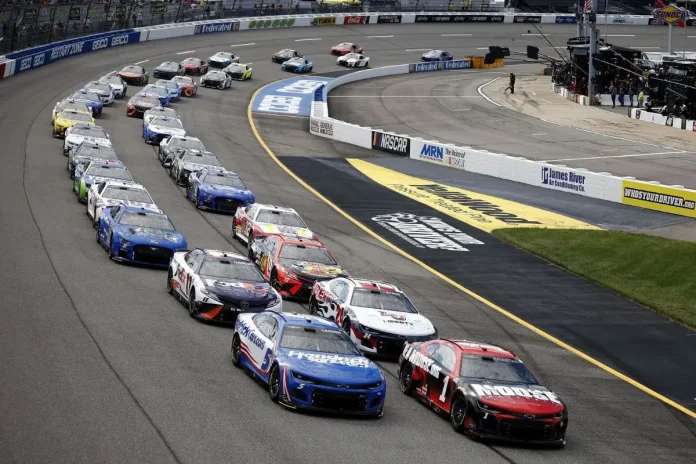Netflix Ditches NASCAR’s Most Popular Driver: Chase Elliott, NASCAR’s most popular driver, has declined to participate in Netflix’s docuseries Full Speed Season 2, sparking disappointment among fans. His choice highlights a broader trend among elite athletes prioritizing privacy and control over their personal narratives. While some fans feel betrayed and demand more engagement, citing a disconnect between Chase Elliott and his supporters, others recognize the potential benefits of maintaining personal boundaries for brand integrity. This situation raises questions about the future of driver engagement in NASCAR and its influence on fan loyalty.
Key Highlights
- Chase Elliott declined to participate in Netflix’s docuseries, prioritizing personal privacy over public exposure amid pressures of fame in the NASCAR community.
- Fans expressed disappointment and criticism, viewing Elliott’s decision as a betrayal of loyalty to NASCAR and its community.
- The absence of key figures like Elliott is seen as a setback for NASCAR’s visibility and engagement with broader audiences through the series.
- Critics argue Elliott’s reluctance to embrace public projects hinders his potential to connect with fans and promote NASCAR’s narrative.
- The backlash highlights a growing disconnect between NASCAR drivers and fans, emphasizing the need for better communication and engagement strategies.
Chase Elliott Declines Appearance in Full Speed Docuseries
Chase Elliott, widely regarded as NASCAR’s most popular driver, has made the surprising decision to decline participation in Netflix’s much-anticipated docuseries, Full Speed Season 2. This unexpected move raises questions about the selection criteria for featured drivers, especially considering that other notable figures, such as two-time Cup Series champion Kyle Busch, also missed the cut.
Elliott’s absence could be perceived as a considerable oversight by the production team, especially given his status and fan base. Speculations suggest that the documentary may prioritize drivers who qualify for the playoffs, yet Elliott himself has expressed skepticism regarding this criterion. This ambiguous standard leads to broader implications about the representation of drivers in media and the potential consequences of such decisions on fan engagement.
The decision not to include Elliott could stem from his personal preference for maintaining a degree of privacy during his expanding career. As a driver who has navigated the pressures of fame, his choice may reflect a desire to control his narrative outside the confines of scripted media portrayals.
Moreover, this absence could also indicate an evolving landscape in NASCAR’s media representation, where the focus might shift towards drivers who embody a specific competitive narrative. Fans and industry insiders alike are left to ponder how this decision will resonate within the NASCAR community and whether it will prompt a reevaluation of the docuseries’ approach to storytelling.
As the premiere date approaches, the dialogue surrounding Elliott and Full Speed Season 2 will certainly intensify.
NASCAR Icons and Driver Legacies
In the landscape of NASCAR, the legacy of its icons often exceeds the racetrack, shaping the sport’s identity and its connection with fans. The drivers themselves become embodiments of the sport, influencing not only the competitive dynamics but also the cultural fabric surrounding NASCAR. Figures like Richard Petty, Dale Earnhardt, Jeff Gordon, and Dale Jr. are not merely celebrated for their racing skills; they are revered as cultural icons whose personalities resonate deeply with fans, nurturing loyalty that surpasses generations.
Conversely, even those drivers perceived as antagonists, such as Joey Logano, Kyle Busch, and Denny Hamlin, contribute considerably to the sport’s narrative. Their rivalries and intense personas create a multifaceted drama that engages spectators, proving that every role in NASCAR carries weight.
Recently asked Chase Elliott if this was the year NASCAR and Netflix had been able to talk him into participating in the Full Speed documentary pic.twitter.com/F5WRKN8350
— Matt Weaver (@MattWeaverRA) November 1, 2024
However, the current landscape presents a challenge; the absence of dominant personalities capable of NASCAR fan support raises concerns about the sport’s future.
In this context, NASCAR’s partnership with platforms like Netflix reflects a tactical effort to cultivate new narratives and broaden the sport’s appeal. By providing fans with deeper insights into drivers’ lives and personalities, the league aims to forge stronger connections and attract new audiences.
This initiative acknowledges that the core of NASCAR extends far beyond the racetrack, intertwining drivers’ legacies with the very identity of the sport itself. As NASCAR navigates this pivotal moment, the legacies of its icons—both heroes and villains—will certainly play a critical role in shaping its path.
Chase Elliott Chooses Privacy Over Publicity
For many athletes, fame and visibility are often seen as essential components of their careers, yet some, like NASCAR driver Chase Elliott, prioritize personal privacy over public exposure. This choice was clearly demonstrated when Elliott opted out of participating in Netflix’s documentary series, “Full Speed,” a project that many anticipated would raise the profile of NASCAR and its stars. When queried about his decision, Elliott’s terse response, “Ah, no,” succinctly encapsulated his stance on the matter.
Elliott’s choice signals a deliberate approach to his public persona, prioritizing his personal space and mental well-being over the commercial appeal of increased visibility. In an era where social media and reality television often blur the lines between personal life and public persona, Elliott’s reticence stands out as a form of resistance against the relentless push for exposure. His decision reflects a growing trend among elite athletes who are increasingly aware of the potential pitfalls of fame, including examination and loss of privacy.
Furthermore, Elliott’s choice to remain absent from a project that could have greatly strengthened his brand demonstrates a maturity that goes beyond the immediate attraction of publicity. By maintaining boundaries, he not only preserves his individuality but also challenges the conventional narrative that equates success with constant visibility.
Fans Criticize Elliott’s Decision
The decision of NASCAR’s most popular driver to decline participation in Netflix’s highly anticipated documentary series has ignited a wave of criticism among fans. This unexpected move has led many to question not only Elliott’s commitment to the sport but also his claim to the title of NASCAR’s most popular driver. The backlash reveals a deeper concern within the fanbase about the growing disconnect between drivers and their supporters.
NASCAR Fans have expressed their dismay through diverse platforms, suggesting that Elliott’s choice reflects a broader trend where athletes prioritize personal boundaries over fan engagement. Many fans feel that such a high-profile refusal undermines the spirit of the sport, which thrives on connection and fellowship.
“This is why I’ve always hated Elliott. Dude was literally born with a silver spoon in his mouth.” – nascar fans’ reaction
The crux of the criticism lies in the belief that as a prominent figure in NASCAR, Elliott has a responsibility to engage with his fanbase, particularly through platforms that amplify the sport’s visibility. His absence from the documentary not only deprives fans of an intimate look at his experience but also raises questions about his dedication to promoting NASCAR’s future.
NASCAR Fans Demand More Engagement From Elliott
Amid the backlash surrounding his decision to skip Netflix’s documentary series, fans are increasingly vocal about their desire for Chase Elliott to improve his engagement with the NASCAR community.
As a driver shaped by a legacy, being the son of Bill Elliott and racing for Hendrick Motorsports, expectations are inherently high. However, his recent choice to forgo a prominent opportunity has sparked discontent among fans who feel that he should utilize his fame to promote the sport more actively.
Critics argue that Elliott’s reluctance to participate in high-profile projects reflects a broader issue within NASCAR’s current generation of drivers, who seem less inclined to cultivate a public persona.
“and you wonder why we don’t have that modern jeff gordon jimmie johnson type pop culture knowledge…” – nascar fans’ reaction
NASCAR Fans express frustration, noting that while Elliott consistently garners votes as the most popular driver, his engagement appears limited to traditional NASCAR audiences, leaving potential new fans untapped. The sentiment is clear: the sport requires ambassadors who resonate beyond core followers.
“Why do fans keep voting him most popular? He clearly isn’t willing to put in the work to be known outside of the core fan base.” – nascar fans’ reaction
Comparisons to Dale Earnhardt Jr. underscore the point; Jr.’s transformation into a charismatic figure willing to accept the spotlight demonstrates the advantages of proactive engagement.
“How is this guy the most popular driver? Like I get, he’s being a normal dude, but his unwillingness to promote the sport on a major platform is ridiculous. Even Jr, who did not love the spotlight was willing to put himself out there.”- nascar fans’ reaction
The Netflix series presents an invaluable platform for drivers to connect with broader audiences, and Elliott’s absence is seen as a missed opportunity that could hinder NASCAR’s growth.
News in Brief: Netflix Ditches NASCAR’s Most Popular Driver
The decision of Chase Elliott to decline participation in the Netflix docuseries “Full Speed” raises important questions regarding the intersection of driver privacy and public engagement in the sport of NASCAR. While Elliott’s choice may prioritize personal boundaries, it has sparked a critical dialogue among fans about the expectations placed on athletes in the public sphere.
This situation emphasizes the evolving dynamics between celebrity culture and individual autonomy, highlighting the delicate balance drivers must navigate in their professional lives.
ALSO READ: Chase Elliott’s Breaking Point? Kevin Harvick Predicts Explosive Aggression at Martinsville!





